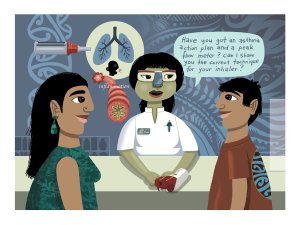Academic pharmacist Nataly Martini discusses the medical management of asthma in adults and adolescents, which has evolved to prioritise early anti-inflammatory treatment. She also explains how to improve patient outcomes by proactively identifying poor asthma control and supporting equitable access to education and treatment
Axed border testing leaves NZ flying blind on new Covid-19 variants - experts
Axed border testing leaves NZ flying blind on new Covid-19 variants - experts
New Zealand is on the back foot in preparing for new Covid-19 variants now requirements for international arrivals to test have ended, health experts say.
Prior to the change in border rules, which was implemented on 12 September, international travellers needed to complete rapid-antigen tests (RATs) on the day they arrived in New Zealand or the day after, and again five or six days later.
Now arrivals are encouraged to test, but it is not a requirement.
In the week prior to the removal of the requirement to test there were 525 border cases.
This plummeted to 94 reported cases in the six days after the new rule came into effect. Although it was possible some border cases had been counted as community cases in Ministry of Health data, due to changes in the way data was being gathered.
University of Auckland microbiologist Siouxsie Wiles said while the reported numbers were murky due to reporting changes, it was doubtful only 94 people out of almost 70,000 travellers who arrived in New Zealand, had Covid-19.
"I'm not a statistician, but that seems highly unlikely, versus a change in our protocol to require people to be tested."
Wiles said border testing provided an early warning system of new variants entering New Zealand, and without this, variants would spread in the community before being noticed.
"We'll be reliant on the tests that have been done in the community, or more increasingly the wastewater testing, looking for variants."
A Ministry of Health spokesperson said arrivals are still given rapid antigen test kits on arrival and encouraged to test and report their results by phone.
"People returning from overseas who return a RAT result that is positive are encouraged to get a PCR test from a community testing centre or healthcare provider and tell the person who does their test that they have been overseas in the last seven days."
But the spokesperson said the ministry would not report border cases separately to community cases anymore.
It was not just the public who would not know how many cases are border related. Environmental Science and Research (ESR) professor Mike Bunce said border information was no longer included with samples sent for genomic sequencing.
He said this was because the dismantling of the Covid-19 Protection Framework meant an Air Border Order which had allowed ESR to get data from customs was no longer available.
In the last batch of samples sequenced there were 275 samples identified as border cases. But he would not know how much this had reduced since the testing requirement was dropped until the next fortnightly reporting was collated.
Bunce expected the numbers identified as border cases had dropped, due to the "soft compliance" approach of relying on health providers to collect the information.
"It's not a big kicker at the moment," he said, because Covid-19 variants in the community matched those detected at the border.
"However if something new turns up, I would say we've softened one part of our surveillance system".
If the number of samples identified as border cases drop to about 20 it would not be enough samples to determine the proportion of each variant entering the country.
"We've just got an underpowered data set," Bunce said.
University of Auckland researcher David Welch had also been working with genomic sequencing of Covid-19 samples. Welch was critical of the decision to drop border tests.
He said a system requiring people to tell health providers they had travelled overseas in the past seven days was too "ad hoc".
"There's always been a three-pronged approach to gathering samples," he said. One was from hospital cases, so scientists could see if a certain strain of Covid-19 caused more severe cases.
The second was community samples, to see what was circulated. And border samples were the third prong, and gave health specialists an early warning system for what variant might hit the community in two to four weeks time.
"We are losing one leg of the stool."
The information from border cases provided a two to four week headstart he said, and had allowed modellers to predict when a new variant might set off a wave of cases.
"Having that few weeks to maybe rearrange hospital appointments or something like that can be very valuable."
The Ministry of Health spokesperson said the organisation monitored overseas variants and it could strengthen border requirements if required.
"At this stage, there are no known variants of Covid-19 circulating globally that would require a change in our current border measures."
It was in discussion with airports and ESR to see if wastewater testing at airports was feasible.
Welch said wastewater testing at airports was interesting, but it was not as simple as the testing system which was in place until 12 September.
"That was working well. It was simple. It was cheap, and it was not onerous on anybody. I don't see why we can't continue with that."
For more news from around the country go to rnz.co.nz





